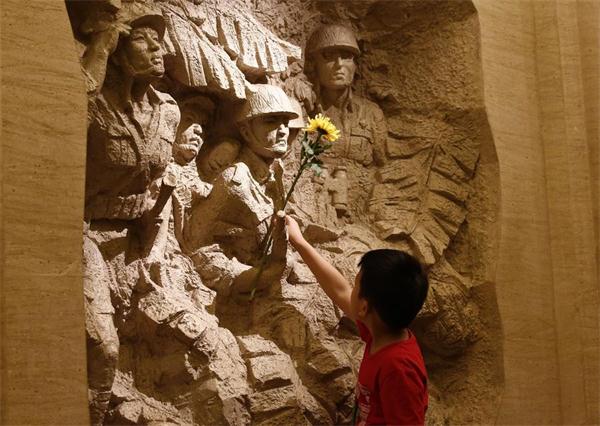China vital to triumph over fascism
Updated: 2015-08-14 08:15
(China Daily)
|
||||||||
 |
|
A boy places a flower on a sculpture depicting China's anti-Japanese war fighters during the World War Two, at the museum of the war of Chinese people's resistance against Japanese aggression in Beijing September 3, 2014, on the day that China marks as the anniversary of its World War Two victory over Japan. [Photo/Agencies] |
Abe, apology is not shameful
As the 70th anniversary of the victory of Chinese People's War of Resistance Against Japanese Aggression (1937-45) and the world's triumph against fascism approached, calls for Japan to own up to its war past started rising.
The world will be watching closely to see whether Japanese Prime Minister Shinzo Abe lives up to its expectations when he delivers a speech on Aug 14, one day ahead of the 70th anniversary of the end of WWII. His speech will reportedly include the words "apology" and "aggression", which were emphasized by former Japanese prime minister Tomiichi Murayama in his landmark statement in 1995.
At a crucial moment for Japan, when it will either reflect on or try to cover its wartime past, Murayama expressed "deep remorse" over and rendered a "heartfelt apology" for Japan's aggression and colonialism, which caused "tremendous damage and sufferings" to many Asian neighbors before and during WWII.
Representing the views of righteous people in postwar Japan, the Murayama Statement is a stark contrast to the irresponsible remarks made by some short-sighted Japanese politicians, who, by doing so, have brought nothing but uncertainty to East Asia.
History shows that neither the "apology" nor the "remorse" tarnished Japan's reputation as a major economy. On the contrary, Murayama's sincere reflection earned Japan more trust, even from China and the Republic of Korea, two of the main victims of Japanese aggression. This improved Japan's ties with China and the ROK and played a key role in safeguarding peace and stability in the region.
Therefore, it is obligatory for all Japanese leaders to reflect on their country's shameful militarist past and break with it for good. Only by doing so can Japan improve relations with its Asian neighbors and boost its national image.
Bu Ping is a researcher with the Institute of Modern History at the Chinese Academy of Social Sciences.
- Global health entering new era: WHO chief
- Brazil's planning minister steps aside after recordings revelation
- Vietnam, US adopt joint statement on advancing comprehensive partnership
- European border closures 'inhumane': UN refugee agency
- Japan's foreign minister calls A-bombings extremely regrettable
- Fukushima impact unprecedented for oceans: US expert

 Stars of Lijiang River: Elderly brothers with white beards
Stars of Lijiang River: Elderly brothers with white beards
 Wealthy Chinese children paying money to learn British manners
Wealthy Chinese children paying money to learn British manners
 Military-style wedding: Fighter jets, grooms in dashing uniforms
Military-style wedding: Fighter jets, grooms in dashing uniforms
 Striking photos around the world: May 16 - May 22
Striking photos around the world: May 16 - May 22
 Robots help elderly in nursing home in east China
Robots help elderly in nursing home in east China
 Hanging in the air: Chongqing holds rescue drill
Hanging in the air: Chongqing holds rescue drill
 2.1-ton tofu finishes in two hours in central China
2.1-ton tofu finishes in two hours in central China
 Six things you may not know about Grain Buds
Six things you may not know about Grain Buds
Most Viewed
Editor's Picks

|

|

|

|

|

|
Today's Top News
Liang avoids jail in shooting death
China's finance minister addresses ratings downgrade
Duke alumni visit Chinese Embassy
Marriott unlikely to top Anbang offer for Starwood: Observers
Chinese biopharma debuts on Nasdaq
What ends Jeb Bush's White House hopes
Investigation for Nicolas's campaign
Will US-ASEAN meeting be good for region?
US Weekly

|

|









